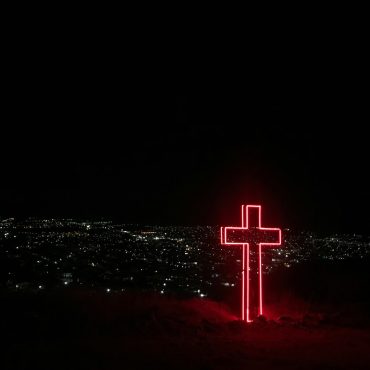-
 play_arrow
play_arrow
OchriO Streaming Live 24/7/365
-
 play_arrow
play_arrow
OchriO Live Stream
-
 play_arrow
play_arrow
London Calling Podcast Yana Bolder



Politicians and governments ask us to pledge allegiance to them. Today’s passage reminds us of the danger of serving earthly rulers.
Scripture:
1 Kings, chapters 13-14; 2 Chronicles, chapter 12; Philippians, chapter 3
2 Chronicles 12:7-12 (NLT):
When the Lord saw their change of heart, he gave this message to Shemaiah: “Since the people have humbled themselves, I will not completely destroy them and will soon give them some relief. I will not use Shishak to pour out my anger on Jerusalem. But they will become his subjects, so they will know the difference between serving me and serving earthly rulers.
So King Shishak of Egypt came up and attacked Jerusalem. He ransacked the treasuries of the Lord’s Temple and the royal palace; he stole everything, including all the gold shields Solomon had made. King Rehoboam later replaced them with bronze shields as substitutes, and he entrusted them, to the care of the commanders of the guard who protected the entrance to the royal palace. Whenever the king went to the Temple of the Lord, the guards would also take the shields and return them to the guardroom. Because Rehoboam humbled himself, the Lord’s anger was turned away, and he did not destroy him completely. There were still some good things in the land of Judah.
Observations:
Serving Earthly Rulers
After Solomon’s death, God divided the kingdom between Rehoboam and Jeroboam. Rehoboam led Judah, and Jeroboam led Israel. Neither of them particularly distinguished themselves. Jeroboam created two golden calves for a worship shrine in Samaria, so his people would not travel to Jerusalem to worship. Rehoboam “abandoned the Law of the Lord,” as we see in 2 Chronicles 12:1; as a result, God determined to abandon Judah to King Shishak of Egypt (12:5). However, when the people heard this message, they repented (verse 6).
God’s response was probably not exactly what they were hoping for: I will not completely destroy them and will soon give them some relief. Two words stand out: completely and soon. In other words, God did not remove the punishment he had decreed, and the relief did not come immediately. As we see in these verses, Shishak still came up and attacked Jerusalem. He ransacked the treasuries and stole everything. But because Rehoboam humbled himself, the Lord’s anger was turned away, and he did not destroy him completely.
“Some Good Things”
Of course, most of us are familiar with how this ultimately played out: Judah continued its downward slide into idolatry and rebellion. Ultimately, God used Babylon to bring his judgment upon them by destroying Jerusalem and carrying the people into exile. But that would not happen for another 300 years or so. But why? Why didn’t God just exercise his judgment then if he knew what would happen?
There were still some good things in the land of Judah. While the leaders had sinned, and “abandoned the Law of the Lord,” not everyone in Judah rejected God. Many people still honored God and obeyed his Law. I think that godly influence probably helped cause the leaders to repent. They still understood God well enough to know that when God announced judgment, it would come. There were still some good things in the land of Judah.
Application:
It is dangerous to presume upon God’s mercy. It’s probably hard for us to understand how people who had seen God work in so many powerful ways could abandon God’s Law and his way, but they did. I think part of the reason why is that they just assumed that God would always be merciful to them. They did not expect that judgment would come upon them after all the ways that God had blessed them.
But that’s exactly why it did come: instead of honoring God, they presumed upon his mercy and expected that God would just allow them to do whatever they wanted. When God determines to chastise his people, he will do it. He did not turn Shishak’s army around; they still came and ransacked Jerusalem. He stole everything – all the valuables that they trusted in. God did not completely destroy them, but they were damaged. He promised them relief soon, but not immediately.
The lesson was simple: they needed to learn the difference between serving me and serving earthly rulers. Earthly rulers often promise all sorts of things – wealth, security, power. (Sound familiar?) God’s people ought to know that everything is in God’s hands, not those of worldly powers. And we need to remember that there is a BIG difference between seeking his purposes and serving earthly rulers.
Prayer:
Father, thank you for reminding us that there is a difference between serving you and serving earthly rulers. Earthly rulers always have an agenda – and that agenda is usually markedly different than yours. Sometimes they may overlap, but often they go off in different directions. Help us not to be deceived into thinking that earthly leaders are aligned with you. Enable us to know the difference between serving earthly rulers and serving you.
Help us also not to put our trust in the things of this world. Rehoboam trusted in wealth, armies, and his palace; we trust in you. Strengthen our faith each day so that we may serve you completely. Amen.
Written by: OchriO
Similar posts
Recent Comments
No comments to show.Featured post

Latest posts
Current show

Impulse
Presented by Dj Ross
For every Show page the timetable is auomatically generated from the schedule, and you can set automatic carousels of Podcasts, Articles and Charts by simply choosing a category.
closeUpcoming shows

Effulgent Amandla!!!
Presented by Dj Ross
12:00 - 15:00
Unretouched Amandla!!!
Presented by Dj Ross
15:00 - 18:00
Stratagem Amandla!!!
Presented by Dj Ross
18:00 - 21:00
Kindle Amandla!!!
Presented by Dj Ross
21:00 - 00:00
Intercession Amandla!!!
Presented by Dj Ross
00:00 - 03:00Chart












Post comments (0)